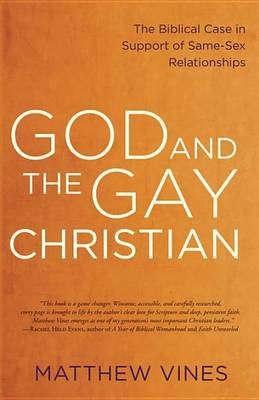
lovelybookshelf
When I hear the words "gay Christian," I think "theologically liberal." I'm not sure I personally know any conservative evangelicals who are supportive of same-sex relationships. So I was completely surprised when I started reading God and the Gay Christian and discovered it is written from a theologically conservative point of view!
Matthew Vines takes a much more literal view of the Bible than, say, a progressive Christian would. This becomes the book's greatest strength, because Vines had to be especially meticulous in his research, which is demonstrated throughout the book, complete with plenty of notes. He believes "our understanding of Scripture can be wrong," that "our fallibility as human interpreters is precisely why" we need "to study the issue more closely" (page 14). His reasoning is solid; his approach is thoughtful and kind. He chooses to use the terms "affirming" and "non-affirming" rather than pro-gay or anti-gay, in order to respect those who believe differently. Not once does he resort to snark or petty jabs, which is so refreshing when reading a book on such a hot-button issue as this.
It's worth mentioning a reminder that transgender people are the "T" in the LGBT umbrella, even if they are straight, so some transfolk may find God and the Gay Christian a bit lacking. They are mentioned in only a few brief paragraphs toward the end of the book (through Kathy Baldock's story). However, Vines does point out that "few groups are more misunderstood, mistreated, or unwelcome in the church today" (page 167).
Regardless, God and the Gay Christian is inspiring and fosters healthy discussion among all Christians. Affirming Christians will find confidence in Vines's optimism and arguments. He encourages people to question the whole "the Bible is very clear" attitude that tends to perpetuate non-affirming stances. Even though the topic of this particular book is same-sex relationships, I got the feeling that Vines would encourage us never to be afraid to take our own thorough, researched, closer look into any faith-related issue.
Let's face it, plenty of people are going to hate this book because of its title alone, without ever opening it. Hopefully, non-affirming Christians won't read this with the intent to tear apart each and every argument, but instead, with the intent to understand and respect a different interpretation among fellow Christians.
I received a copy of this book from the publisher via Blogging for Books to be considered for an honest review.
